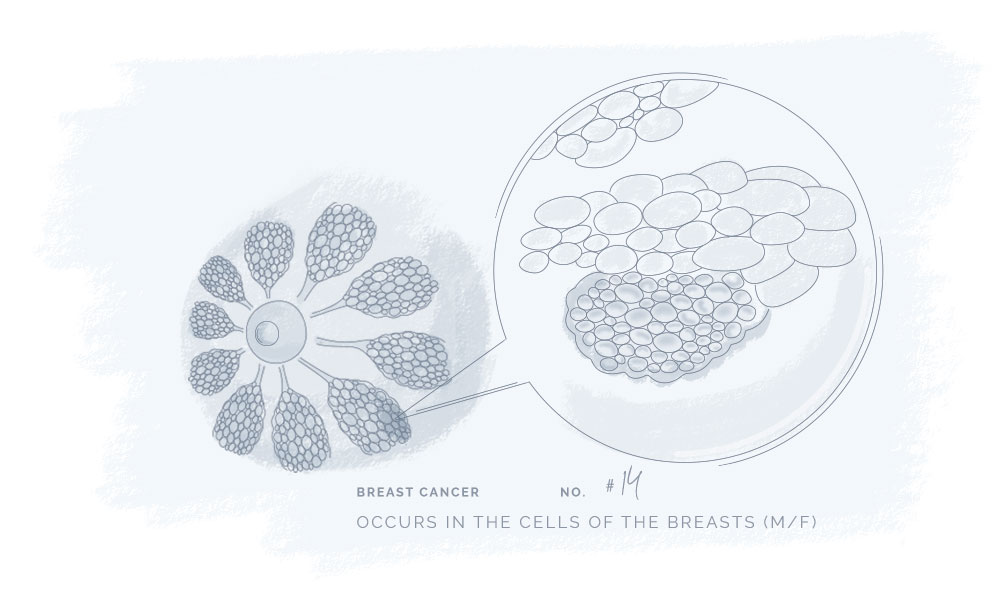Breast Cancer
Category
Cancer
REVIEWED BY
Our Biomedical Scientist
Reviewed based on
Literature Discussion
Last update
August 2020

What is Breast Cancer
Breast cancer is a type of cancer that takes place in the cells of the breasts. It is primarily found in women due to a larger amount of breast tissue.1
Symptoms
The main signs and symptoms of breast cancer may be:1
- Change in shape, size, and form of a breast
- A lump in the breast (a part of the breast that feel different compared to surrounding tissue)
- Dimpling or other changes to the skin over the breast
- Recently inverted nipple
- Scaling of the pigmented skin area surrounding the nipple
Cause
As other types of cancer, breast cancer involves the growth of abnormal cells that contain mutations leading to uncontrollable cell division and growth. Similarly, it can spread and damage/destroy normal tissue. However, in breast cancer, the disease usually develops with cells in the milk-producing ducts known as invasive ductal carcinoma or in the glandular tissue known as invasive lobular carcinoma.1
The main risk factors for developing breast cancer may be but are not limited to:
- Heredity and genetics
- The female sex
- Personal history of other breast diseases
- Radiation exposure
- Obesity
The connection between Cannabinoids & Breast Cancer
Studies find that CBD and THC may have great therapeutic potential and may be used to help treat Breast Cancer. CBD and THC are well-known cannabinoids, however, they do not have the same psychoactive effects. THC is psychoactive while CBD does not possess psychoactive effects. According to WHO guidelines, the cannabidiol CBD is generally well tolerated with a good safety profile.
Preclinical evidence proposes that the cannabinoids CBD and THC may be therapeutic in the treatment of breast cancer, as cannabinoids may exhibit anti-breast cancer activities.
CBD could be combined with the anticancer drug Paclitaxel to inhibit neuropathic pain and boost the effect of this drug.2
In addition, it was observed that autophagy-mediated apoptotic death of tumor cells can be stimulated upon treatment with cannabinoids.3
The literature discussion is an overview of the published results from scientific studies investigating if and how cannabinoids can be beneficial in the treatment of Breast Cancer. The overview will be updated regularly to ensure the newest and most accurate information.
THC and CBD may exhibit anti-cancer activity
Several studies showed that THC and CBD exhibit anti-cancer activity through CB1 and CB2 receptors.4,5
CBD can help in suppressing cancer cell growth and proliferation through ID1 protein process without affecting non-cancer cells.6,7
It was shown that CBD can help in inhibiting the expression of ID1 protein in advanced stages of breast cancer metastasis.8 Furthermore, it was found that CBD can help in suppressing Paclitaxel-induced neuropathic pain
through 5HT1A.9
Clinical trials are research studies that examine new treatments and evaluate their effects on human health outcomes.
Today, we are not able to provide any clinical trials about cannabinoids and Breast Cancer.
- https://www.mayoclinic.org/diseases-conditions/breast-cancer/symptoms-causes/syc-20352470
- https://ghmedical.com/endocannabinoid-system/diseases/breast-cancer
- Rahman, S., Et al. (2019). ” The onus of cannabinoids in interrupting the molecular odyssey of breast cancer: A critical perspective on UPRER and beyond”. https://www.sciencedirect.com/science/article/pii/S1319016419300064
literature - Caffarel et al., (2008). ” JunD is involved in the antiproliferative effect of Delta9-tetrahydrocannabinol on human breast cancer cells. Oncogene 27, 5033–5044”. https://pubmed.ncbi.nlm.nih.gov/18454173/
- Massi et al., (2013). ” Cannabidiol as potential anticancer drug. Br. J. Clin. Pharmacol. 75, 303–312.” https://pubmed.ncbi.nlm.nih.gov/22506672/
- Elbaz et al., (2015). ” Modulation of the tumor microenvironment and inhibition of EGF/EGFR pathway: novel anti-tumor mechanisms of Cannabidiol in breast cancer. Mol. Oncol. 9, 906–919”. https://pubmed.ncbi.nlm.nih.gov/25660577/
- Shrivastava et al., (2011). ” Cannabidiol Induces Programmed Cell Death in breast cancer Cells by Coordinating the Cross-talk between Apoptosis and Autophagy. Mol. cancer Ther. 10, 1161–1172”. https://pubmed.ncbi.nlm.nih.gov/21566064/
- Murase et al., (2014).“ Targeting multiple cannabinoid anti-tumour pathways with a resorcinol derivative leads to inhibition of advanced stages of breast cancer. Br. J. Pharmacol. 171, 4464–4477”. https://pubmed.ncbi.nlm.nih.gov/24910342/
- Ward et al., (2014). ”Cannabidiol inhibits paclitaxel-induced neuropathic pain through 5-HT(1A) receptors without diminishing nervous system function or chemotherapy efficacy. Br. J. Pharmacol. 171, 636–645”. https://pubmed.ncbi.nlm.nih.gov/24117398/
CANNABINOIDS & RECEPTORS
Below you find the plant cannabinoids, cannabinoid receptors, and endocannabinoids that are associated with the potential therapy.
If you have any further information relevant to the connection between Breast Cancer and cannabinoids or find any of the information inaccurate, outdated or incomplete please contact us here.

